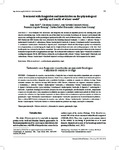Use este identificador para citar ou linkar para este item:
http://www.alice.cnptia.embrapa.br/alice/handle/doc/1009531| Título: | Treatment with fungicides and insecticides on the physiological quality and health of wheat seeds. |
| Autoria: | ABATI, J.  ZUCARELI, C.   FOLONI, J. S. S.   HENNING, F. A.   BRZEZINSKI, C. R.   HENNING, A. A.   |
| Afiliação: | JULIA ABATI, UEL; CLAUDEMIR ZUCARELI, UEL; JOSÉ SALVADOR SIMONETI FOLONI, UEL; FERNANDO AUGUSTO HENNING, CNPSO; CRISTIAN RAFAEL BRZEZINSKI, UEL; ADEMIR ASSIS HENNING, CNPSO. |
| Ano de publicação: | 2014 |
| Referência: | Journal of Seed Science, Viçosa, MG, v. 36, n. 4, p. 392-398, dez. 2014. |
| Conteúdo: | ABSTRACT – Seed treatment with insecticides and fungicides has become an important practice for ensuring initial plant stand in establishing crops. In this context, the aim of this study was to evaluate the infuence of chemical seed treatment with insecticides and fungicides on the physiological quality and health of the seeds of wheat cultivars. Seeds of the wheat cultivars BRS Pardela and BRS Gaivota were used, subjected to the following chemical treatments: 1- control, 2- carboxin + thiram + imidacloprid + thiodicarb, 3- carbendazim + thiram + imidacloprid + thiodicarb, 4- fpronil + thiophanate-methyl + pyraclostrobin, 5- triadimenol + imidacloprid + thiodicarb, 6- fpronil, and 7- imidacloprid + thiodicarb. Physiological quality was evaluated by tests of germination, accelerated aging, the length and dry weight of shoots and roots, and seedling emergence in the feld. Seed health quality was evaluated by the blotter test method. The seeds of the wheat cultivars tested respond differently to the chemical treatments in regard to effects on germination and vigor. The treatment with triadimenol + imidacloprid + thiodicarb is harmful to seedling development. For the BRS Gaivota cultivar, the seed treatment with carboxin + thiram + imidacloprid + thiodicarb; and carbendazim + thiram + imidacloprid + thiodicarb improved seedling establishment in the feld compared to the control. RESUMO - O tratamento de sementes com inseticidas e fungicidas tem se tornado uma prática importante para assegurar o estande inicial de plantas na implantação das lavouras. Diante disso, o objetivo foi avaliar a infuência do tratamento químico de sementes com inseticidas e fungicidas sobre a qualidade fsiológica e sanitária de sementes de cultivares de trigo. Foram utilizadas sementes das cultivares de trigo BRS Pardela e BRS Gaivota, submetidas aos seguintes tratamentos químicos: 1- testemunha, 2- carboxin + thiram + imidacloprido + tiodicarbe, 3- carbendazim + thiram + imidacloprido + tiodicarbe, 4- fpronil + tiofanato metílico + piraclostrobina, 5- triadimenol + imidacloprido + tiodicarbe, 6- fpronil e 7- imidacloprido + tiodicarbe. A qualidade fsiológica foi avaliada por meio dos testes de germinação, envelhecimento acelerado, comprimento e massa seca de parte aérea e raiz, emergência de plântulas em campo e a qualidade sanitária pelo método do blotter test. As sementes das cultivares de trigo testadas respondem de forma diferenciada aos tratamentos químicos quanto aos efeitos na germinação e vigor. O tratamento com triadimenol + imidacloprido + tiodicarbe é prejudicial ao desenvolvimento de plântulas. Para a cultivar BRS Gaivota o tratamento de sementes com carboxin + thiram + imidacloprido + tiodicarbe e carbendazim + thiram + imidacloprido + tiodicarbe favorece o estabelecimento das plântulas em campo, em relação a testemunha. |
| Thesagro: | Tratamento de semente Trigo Germinação Fungicida Inseticida |
| NAL Thesaurus: | Seed treatment Wheat Insecticides Fungicides |
| ISSN: | 2317-1537 |
| Digital Object Identifier: | 10.1590/2317-1545v36n41006 |
| Tipo do material: | Artigo de periódico |
| Acesso: | openAccess |
| Aparece nas coleções: | Artigo em periódico indexado (CNPSO)  |
Arquivos associados a este item:
| Arquivo | Descrição | Tamanho | Formato | |
|---|---|---|---|---|
| Treatmentwithfungicidesandinsecticidesonthephysiological.pdf | 718,64 kB | Adobe PDF |  Visualizar/Abrir |









